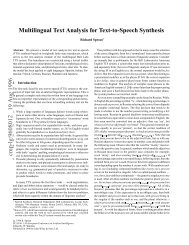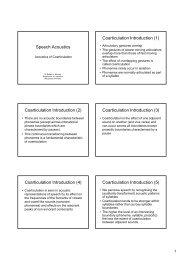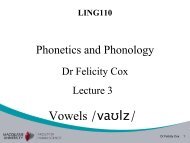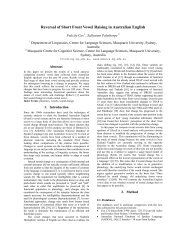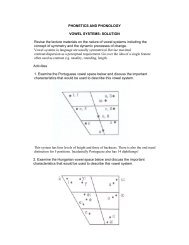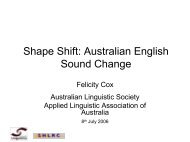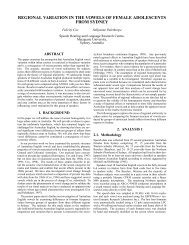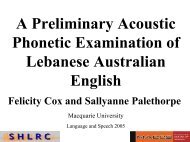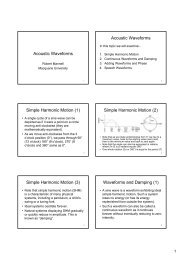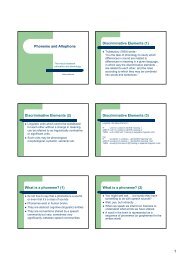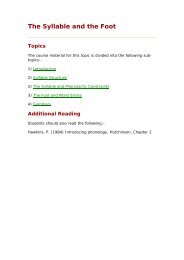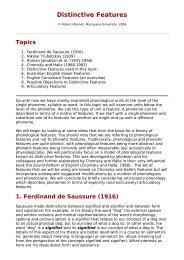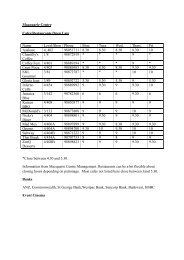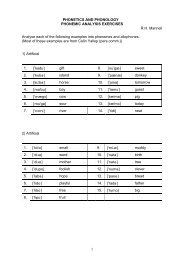Festival Speech Synthesis System: - Speech Resource Pages
Festival Speech Synthesis System: - Speech Resource Pages
Festival Speech Synthesis System: - Speech Resource Pages
You also want an ePaper? Increase the reach of your titles
YUMPU automatically turns print PDFs into web optimized ePapers that Google loves.
a list of syllables. Each member will also be in a the SylStructure relation. In that relation its parent will<br />
be the word it is in and its daughters will be the segments that are in it. Syllables are also in the Intonation<br />
relation giving links to their related intonation events.<br />
Segment<br />
a list of segments (phones). Each member (except silences) will be leaf nodes in the SylStructure<br />
relation. These may also be in the Target relation linking them to F0 target points.<br />
IntEvent<br />
a list of intonation events (accents and bounaries). These are related to syllables through the Intonation<br />
relation as leafs on that relation. Thus their parent in the Intonation relation is the syllable these events are<br />
attached to.<br />
Intonation<br />
a list of trees relating syllables to intonation events. Roots of the trees in Intonation are Syllables and<br />
their daughters are IntEvents.<br />
Wave<br />
a single item with a feature called wave whose value is the generated waveform.<br />
This is a non-exhaustive list some modules may add other relations and not all utterance may have all these relations,<br />
but the above is the general case.<br />
[ < ] [ > ] [ > ] [Top] [Contents] [Index] [ ? ]<br />
14.2 Utterance types<br />
The primary purpose of types is to define which modules are to be applied to an utterance. UttTypes are defined in<br />
`lib/synthesis.scm'. The function defUttType defines which modules are to be applied to an utterance of<br />
that type. The function utt.synth is called applies this list of module to an utterance before waveform synthesis is<br />
called.<br />
For example when a Segment type Utterance is synthesized it needs only have its values loaded into a Segment<br />
relation and a Target relation, then the low level waveform synthesis module Wave_Synth is called. This is<br />
defined as follows<br />
(defUttType Segments<br />
(Initialize utt)<br />
(Wave_Synth utt))<br />
A more complex type is Text type utterance which requires many more modules to be called before a waveform can<br />
be synthesized<br />
(defUttType Text<br />
(Initialize utt)<br />
(Text utt)<br />
(Token utt)<br />
(POS utt)<br />
(Phrasify utt)<br />
(Word utt)<br />
(Intonation utt)<br />
(Duration utt)<br />
(Int_Targets utt)<br />
(Wave_Synth utt)<br />
)<br />
The Initialize module should normally be called for all types. It loads the necessary relations from the input<br />
form and deletes all other relations (if any exist) ready for synthesis.<br />
Modules may be directly defined as C/C++ functions and declared with a Lisp name or simple functions in Lisp that<br />
check some global parameter before calling a specific module (e.g. choosing between different intonation modules).



